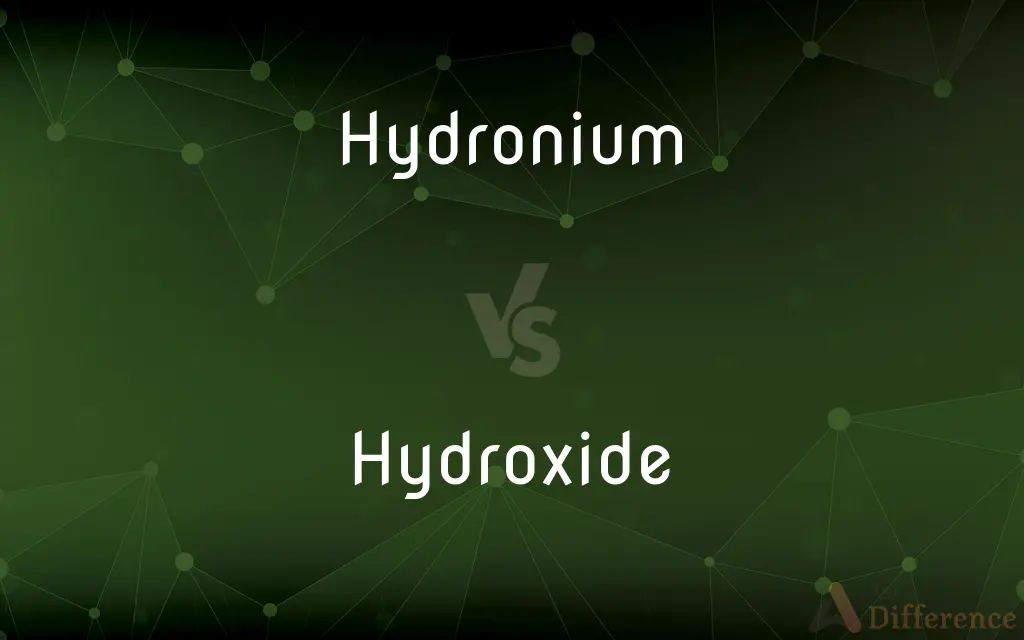Hydronium vs. Hydroxide — What's the Difference?
By Maham Liaqat & Fiza Rafique — Updated on April 4, 2024
Hydronium ions (H3O+) are positively charged and form in water, whereas hydroxide ions (OH-) carry a negative charge, critical in acidity and alkalinity.

Difference Between Hydronium and Hydroxide
Table of Contents
ADVERTISEMENT
Key Differences
Hydronium ions result from the protonation of water, forming when water molecules gain a hydrogen ion (H+). This process is central to the concept of acid in aqueous solutions, as acids are substances that increase the concentration of hydronium ions in water. On the other hand, hydroxide ions are the negatively charged counterparts formed when a water molecule loses a hydrogen ion. These ions are pivotal in the behavior of bases, which are substances that increase the concentration of hydroxide ions in water.
The presence of hydronium ions in a solution indicates acidity, with a higher concentration correlating to a stronger acid. In contrast, hydroxide ions signify alkalinity, where a higher concentration indicates a stronger base. The balance between these ions in a solution determines its pH level, a measure of its acidity or basicity.
Hydronium ions play a crucial role in the acid-base reactions, acting as the proton donor in such reactions. These reactions are fundamental to many processes in chemistry and biochemistry. Conversely, hydroxide ions act as proton acceptors in base-induced reactions, making them essential for various chemical and biological processes.
In terms of stability, hydronium ions are relatively short-lived in solution, quickly reacting with other molecules. They are often stabilized by solvation in water. Hydroxide ions, while also reactive, are a bit more stable and can exist as free ions in solution or precipitate out as part of a salt.
The concentration of hydronium and hydroxide ions in a solution is inversely related, governed by the water dissociation constant (Kw). As the concentration of hydronium ions increases, that of hydroxide ions decreases, and vice versa, maintaining a constant product at a given temperature.
ADVERTISEMENT
Comparison Chart
Charge
Positive
Negative
Formation
Gains a hydrogen ion from water
Loses a hydrogen ion from water
Role in pH
Indicates acidity
Indicates alkalinity
Stability
Short-lived, stabilized by solvation
More stable, can precipitate as salt
Reaction Role
Acts as proton donor
Acts as proton acceptor
Compare with Definitions
Hydronium
A water molecule with an extra hydrogen ion attached, forming a positive charge.
In acidic solutions, the concentration of hydronium ions increases.
Hydroxide
Can form salts with metals.
Hydroxide ions combine with calcium ions to form calcium hydroxide.
Hydronium
Stabilized by water molecules.
Hydronium exists in a dynamic equilibrium in water.
Hydroxide
A negatively charged ion made of oxygen and hydrogen.
Sodium hydroxide releases hydroxide ions in water.
Hydronium
The active form of an acid in water.
The reaction's rate depends on the concentration of hydronium ions present.
Hydroxide
Affects the solubility of substances.
Adding hydroxide ions can precipitate some metals out of solution.
Hydronium
Measured to determine acidity.
PH meters indirectly measure the concentration of hydronium ions in a solution.
Hydroxide
Indicates a substance's basicity.
The presence of hydroxide ions is a key factor in determining a solution's pH.
Hydronium
A key player in acid-base reactions.
Hydronium ions donate a proton to the base during neutralization.
Hydroxide
Involved in neutralization reactions.
Hydroxide ions react with hydronium ions to form water.
Hydronium
In chemistry, hydronium (hydroxonium in traditional British English) is the common name for the aqueous cation H3O+, the type of oxonium ion produced by protonation of water. It is often viewed as the positive ion present when an Arrhenius acid is dissolved in water, as Arrhenius acid molecules in solution give up a proton (a positive hydrogen ion, H+) to the surrounding water molecules (H2O).
Hydroxide
Hydroxide is a diatomic anion with chemical formula OH−. It consists of an oxygen and hydrogen atom held together by a single covalent bond, and carries a negative electric charge.
Hydronium
A hydrated hydrogen ion, H3O+. Also called hydronium ion.
Hydroxide
A chemical compound, especially an ionic compound, containing a hydroxyl group.
Hydronium
(inorganic chemistry) The hydrated hydrogen ion, H3O+.
Hydroxide
(chemistry) An univalent anion (OH-) based on the hydroxyl functional group.
Hydroxide
Any substance containing such an anion.
Hydroxide
A hydrate; a substance containing hydrogen and oxygen, made by combining water with an oxide, and yielding water by elimination. The hydroxides are regarded as compounds of hydroxyl, united usually with basic element or radical; as, calcium hydroxide ethyl hydroxide.
Hydroxide
A compound of an oxide with water
Hydroxide
A chemical compound containing the hydroxyl group
Common Curiosities
What role do hydronium ions play in acid-base reactions?
Hydronium ions act as proton donors in acid-base reactions, often resulting in the formation of water and a salt.
What role do hydroxide ions play in acid-base reactions?
Hydroxide ions act as proton acceptors in base-induced reactions, contributing to the formation of water and a salt.
What is the relationship between hydronium and hydroxide ions in water?
The product of the concentrations of hydronium and hydroxide ions in water is constant at a given temperature, reflecting the water's self-ionization.
How do hydroxide ions affect pH?
Hydroxide ions increase the alkalinity of a solution; the higher their concentration, the higher the pH.
What is a hydroxide ion?
A hydroxide ion is an ion that consists of one oxygen and one hydrogen atom bonded together, carrying a negative electrical charge (OH-).
How do hydronium ions affect pH?
Hydronium ions increase the acidity of a solution; the higher their concentration, the lower the pH.
How is the stability of hydronium ions in water?
Hydronium ions are relatively unstable, quickly reacting with other molecules but are stabilized by solvation in water.
How is the stability of hydroxide ions in water?
Hydroxide ions are more stable than hydronium ions and can exist freely in water or as part of a compound.
What does a high concentration of hydroxide ions indicate?
A high concentration of hydroxide ions indicates that a solution is basic or alkaline.
What is a hydronium ion?
A hydronium ion is a water molecule (H2O) that has gained an extra hydrogen ion (H+), resulting in a positive charge (H3O+).
Can hydronium and hydroxide ions exist together in a solution?
Yes, both types of ions can coexist in a solution, with their concentrations determining the solution's overall pH.
What does a high concentration of hydronium ions indicate?
A high concentration of hydronium ions indicates that a solution is acidic.
How do you measure the concentration of hydronium ions in a solution?
The concentration of hydronium ions in a solution is typically measured indirectly via pH meters.
What happens when hydronium and hydroxide ions meet in a solution?
When hydronium and hydroxide ions meet in a solution, they react to form water, a process that is central to neutralization reactions.
How do you measure the concentration of hydroxide ions in a solution?
The concentration of hydroxide ions is also measured indirectly through pH, or more directly through titration methods.
Share Your Discovery

Previous Comparison
Actuary vs. Underwriter
Next Comparison
Plain vs. BlankAuthor Spotlight
Written by
Maham LiaqatCo-written by
Fiza RafiqueFiza Rafique is a skilled content writer at AskDifference.com, where she meticulously refines and enhances written pieces. Drawing from her vast editorial expertise, Fiza ensures clarity, accuracy, and precision in every article. Passionate about language, she continually seeks to elevate the quality of content for readers worldwide.














































